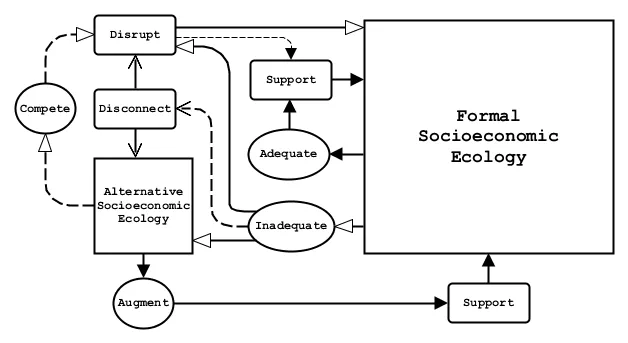
Historically, rituals regulated societies, in part by reducing ambiguous social information to binary signals. Roy Rappaport termed this regulative process the cybernetics of the holy. His cybernetics depend on particularly defined ultimate sacred postulates and cosmological axioms, which don't really exist in the modern world. Still, they're interesting to consider.
This article by Connor Wood considers initiation rites. Here's a quote:
Roy Rappaport believed that ritual was something like the action potential of human cultures. Namely, ritual is a digital processing system that takes the messy, unclear data of social life, transforms it into binary signals, and sends those nice clear signals into the world.
A good example is puberty rites and initiation ceremonies. ... In initiation rites, cultures take a continuous, analog physiological process and ritually transform it into a digital – that is, binary – shift in social roles. One day, you're a boy. The next day, you go out to the bush, suffer through an initiation rite, and BAM – you’re a man. ... The amount of noise in the signal of social life is reduced. Of course biologically nothing has changed, but socially your expectations about your role and how you're supposed to behave are irrevocably shifted. Out of a whole ton of vague, ambiguous biological information, an initiation rite distills a single, crisp social signal. Without a ritual acknowledgment of your transition, you might never be quite sure whether you’re a boy, whether you’re a man, whether you’re somewhere in between, or what you’re supposed to act like.
Noise, but no clear signal
In the US today, we tell ourselves and each other a wide variety of stories about ourselves and each other. Few things are sacred, and universal truths have long been cast aside in favor of endlessly subjective perspectives that border on the solipsistic. The upside of this is increasing acceptance of diversity. The downside is that our species' evolved ritual mechanisms for reducing social noise to meaningful signals no longer exist.
This has weird implications. In a sense, the absence of initiation rites has trapped many in perpetual adolescence. Society at large recognizes passage into adulthood only with an impersonal change in legal status. Yet we evolved over countless generations to expect something more visceral and personal and overall clear. Without this clarity, people flounder.
In this and other areas, there's plenty of noise, but no meaningful signal. And because society is heterogeneous, attempting to revive old rituals in society at large is a non-starter, since successful rituals are inherently bound to the unique cultures they regulate. Removing their cultural context makes the information they produce less meaningful.
Unlike societies throughout history, our society is not regulated by Rappaport's cybernetics of the holy. It is instead regulated by material power. Our control regime isn't beholden to its subjects in the same way a tribal chieftain's government is. It rules over us mechanically, with people, resources, and technologies.
In Rappaport's scheme, any leader's rule can be challenged on religious grounds by a prophetic movement that reinterprets an ultimate sacred postulate or cosmological axioms to recast the leader as unholy. This rebellion creates an alternative reality wherein the leadership group no longer has the support of the gods. It's essentially an attempt to reorganize the complex information system that governs the tribe.
I would argue that we're primed for this manner of political change in a similar way as we're primed for initiation rituals. Some tribal part of us believes that the control regime derives its power from us, despite ample evidence to the contrary. Voting systems are a great trick for convincing this part of us that we're participating in important governance rituals. But voting can't change the control regime, only the personalities speaking for it in a given moment.
Just for fun, I created a cybernetic diagram of the total economic system, inspired by the relationship between a leadership group and a prophetic movement that arises to challenge its rule. In this diagram, the formal socioeconomic ecology represents the leadership group and the alternative socioeconomic ecology represents the prophetic movement. Various factors determine whether the alternative ultimately ends up supporting or disrupting the mainstream. I find the feedback loops involved fascinating.

(Feature image from Pixabay.)
Read my novels:
- Small Gods of Time Travel is available as a web book on IPFS.
- The Paradise Anomaly is available in print via Blurb and for Kindle on Amazon.
- Psychic Avalanche is available in print via Blurb and for Kindle on Amazon.
- One Man Embassy is available in print via Blurb and for Kindle on Amazon.
- Flying Saucer Shenanigans is available in print via Blurb and for Kindle on Amazon.
- Rainbow Lullaby is available in print via Blurb and for Kindle on Amazon.
- The Ostermann Method is available in print via Blurb and for Kindle on Amazon.
- Blue Dragon Mississippi is available in print via Blurb and for Kindle on Amazon.
See my NFTs:
- Small Gods of Time Travel is a 41 piece Tezos NFT collection on Objkt that goes with my book by the same name.
- History and the Machine is a 20 piece Tezos NFT collection on Objkt based on my series of oil paintings of interesting people from history.
- Artifacts of Mind Control is a 15 piece Tezos NFT collection on Objkt based on declassified CIA documents from the MKULTRA program.